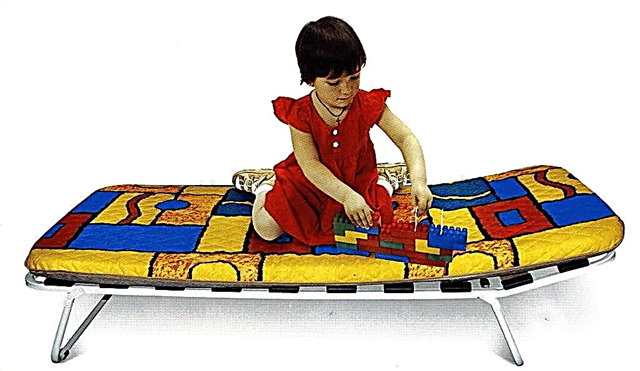Excessive caring and inappropriate criticism of parents by grandparents sometimes creates tension in the family. When and how should relatives be stopped?
Even the classics spoke about the conflict of generations. Alas, from century to century the situation does not change much, and the elders always “know better”, and the young are trying to defend their point of view. In disputes, as you know, truth is born, which determines the progress of mankind. But not always. Sometimes the new generation already has time to acquire their own children, and overly active parents try in every possible way to promote and even impose their own models of behavior, sometimes in front of the little ones. Let's analyze the situations when grandparents simply need to be stopped for the good of the whole family.

1. “We raised you, so we know better how to raise your children”
You think that the Montessori pedagogical system is a great option for raising your baby, you found the appropriate kindergarten and applied there. Upon learning of this, the grandmother falls into hysterics and declares that she is a teacher with a quarter-century of experience, a nominee, diploma winner, laureate and bearer of all kinds of regalia and in no case will you allow you to cripple the child's psyche with the wrong (from her point of view) education ...
And, perhaps, everything is exactly the opposite - you adhere to the most traditional views. But the "more advanced" grandparents consider the only correct method of Rudolf Steiner, and have already looked after the appropriate kindergarten for the granddaughter with homemade toys, or insist that the child be tempered according to the Porfiry Ivanov system.
Another situation. A mother, quite "traditional" in matters of handling a baby, walks with her baby in a stroller. And, again, modern grandparents, ardent adherents of slingoculture, give her a sling and recommend using it too strongly. For relatives recently read on the Internet that it is more useful for a small child to be with his mother all the time, so he feels safe and grows less anxious.
But no, perhaps it is you with both hands for the sling, and the older generation is literally shaking from the lack of strollers, cots, and other familiar "belongings for babies" in your everyday life.
Nobody is interested in your opinion in both cases; your arguments are declared absurd in advance. This is called imposing a parenting model on you.
How to say stop. Formulate for yourself firmly: “This is my child and nobody else. Therefore, the responsibility for his future and all the risks associated with his upbringing, training and the process of socialization lies solely with me. So, it’s up to me to decide how all these processes will take place for the baby ”. If you yourself believe in this, then it will be much easier to convey the meaning to your grandparents.
2. "No matter how hard the matchmakers try to become beloved grandparents, we are still better."
Alas, it is not so uncommon for a father-in-law with mother-in-law and father-in-law with mother-in-law to create coalitions and stubbornly "fight" for the right to be the best in the eyes of children and grandchildren. Of course, in a sense, one can only dream of relatives who are ready to run to help in any situation day and night, vying with each other about material and moral support and at the first request. Everything is so until we are talking about a direct threat to the health and success of the child.
For example, a little girl with an allergy to citrus fruits "loving" grandparents buy tangerines ("New Year's Eve, it won't hurt a little granddaughter"), and her older brother is allowed to stay up late on the Internet before a responsible six-month test. If only the children publicly admit that it is these grandparents who are the best, because other relatives do not allow this. And yet, it is they who give more expensive gifts, and for no reason, and not just for a holiday. And in theaters and in the cinema they often drive. And they are allowed to eat sweets before dinner in any quantity, not like some grymzes, who, as if they were not children themselves ... Accordingly, the "offended" side immediately takes countermeasures similar to those described above. Whoever wins such a "battle", your children will lose.

How to say stop... If you value the help of loved ones, you will have to "show the miracles of balancing act" and be a diplomat. You cannot publicly give preference to anyone. At family gatherings, in no case show your preferences, but maneuver in personal conversations: for example, separately try to explain to your own mother and mother-in-law that the grandson loves both of them equally and cannot choose between loved ones, that they are equally dear to you , and for grandchildren, and call for common sense. If relatives are not overly belligerent "for life", passions should subside over time.
3. “We are not young anymore, all bones are aching, but we selflessly do everything we can for you”
Surely many of us have watched how very young, quite cheerful ladies often complain to others about how they get knocked off their feet, helping the “youth” with their grandchildren, even if we are talking about one-time actions every three months.
A 46-year-old young grandmother spent a week with her daughter's family, who had just been discharged from the hospital after a difficult birth, helping the newly-made mother to take care of the baby. And now, for seven years, at every opportunity, “granny” tells how hard it was for her to leave her husband-heart at home, how difficult it was at “her age” to get up at night to a crying child, and how much washing then she had share ...
This is not an isolated case. Often "parents of parents" speculate on age and health, sometimes even exaggerating their role, just to prove to themselves and those around them their importance. And all would be fine, but such complaints can be systematically heard by a baby, in the understanding of which grandparents cannot deceive or exaggerate.
It would seem that no one is hot or cold from these complaints, there is only one "but": a small child does not understand that in this way his grandmother is simply trying to attract attention to herself and deserve praise.
This means that they are sick and unhappy, and at the same time sacrifice the latter for his sake. And he is guilty before them. He is to blame for the fact that it takes time, attention of energy, that he was born, in the end ... And what thoughts can this push him to? .. There it is already not far from serious complexes ...
How to say stop... The casket opens simply. Let's be frank - you didn't give birth to your child for your grandparents, but for yourself. No one is obliged to help you on a regular basis, and if you are being helped, and you accept this help even the most trifling one, then be able to be sincerely grateful for it. And do not hesitate to emphasize once again how much grandparents do for you, do not skimp on words of gratitude and appreciation, do not pretend that this is a matter of course. Then, quite possibly, the flow of complaints will sharply decrease. At the same time, do not discount the fact that relatives can really be exhausted by caring for restless grandchildren. Try to unload them as much as possible. After all, helping children is a voluntary matter, and not a matter of course.
4. “Your mom doesn’t cook well, but your dad’s hands are growing out of the wrong place”
Grandparents openly turn the child against you. This case is similar to the previous one, with the only difference that parents, that is, yourself, become the object of constant criticism. And this is completely impermissible.
Alas, some parents tend to consider constant criticism, including public criticism, just a method of education. Sometimes, "by inertia", they start to complain about their child, even when he does not hear it. But, if earlier it was exclusively your business with them, now your baby regularly hears such attacks. Perhaps even in a frankly offensive form: “I'd rather take a walk with you, otherwise you’ll get hit by a car at your half-mother’s one day,” or in another similar one. And this is unacceptable, as it undermines your authority in the eyes of the child and your psycho-emotional connection with him.

How to say stop... Of course, attacks are offensive, but responding with a lunge to a lunge is counterproductive. Analyze Your Own Behavior Better Maybe you are overly busy with yourself, paying unacceptably little attention to your baby? Or have you never learned how to cook anything tastier and healthier than "semolina with lumps"? Or maybe your house is really so dirty that it's time to call a cleaning service? If, deep down, you agree with the comments, and only the form evokes protest, immediately start working on yourself. The sooner you show positive dynamics, the less reason your parents have to shower you with complaints. However, try to convey to relatives that you should not voice even the most fair criticism in the presence of your child. Beloved relatives should be placed in a rigid framework: all claims are expressed to you personally and only to you. Provocative remarks about parents in the presence of a child are unacceptable. If you are sure that relatives are denigrating you in front of the baby with malicious intent, stop communicating with them until they change their minds. Most often this happens if the mother-in-law initially disliked the daughter-in-law ... Here you will have to act decisively - perhaps even for a while to stop communicating between the grandson and the grandparents.
5. “Mom is good, but grandma is better”
Grandparents literally dissolve into grandchildren, trying to replace their parents. They have their own opinion for each case - of course, radically different from yours, only they know "how the child will be better", and try to participate in all moments of his life, even when you don't ask them for anything.
Sometimes grandparents, instead of enjoying the well-deserved peace after raising their own children, begin to behave like parents towards their grandchildren. This is similar to the first case we examined, with the only difference that the influence of the older generation penetrates literally all spheres of a child's life. Everything from potty training techniques to family fun in the summer. Orders are imposed that do not correspond to your point of view on the problem. You are constantly “relegated to the background”, pulling and “educating” in parallel with the baby.
How to say stop.
When grandparents compulsively move into the parental subsystem, trying to perform the functions of mom and dad for the baby, this is a very alarming call for yourself. Most likely, you look too infantile in the eyes of the older generation to play a parental role. Do not be offended by your relatives - it is better to think about why they do not consider you adults who deserve to be responsible for their own child. It is possible to change the situation only by adult, balanced actions, proving that you are a mature person.
Have you proved to your parents that you are a mature person, capable of taking care of children on your own? Apparently, your parents were not convinced by this evidence, because for some reason they still do not perceive you as an adult. The advice is the same as in the previous situation: analyze your behavior and work on yourself. Only mature, balanced actions will show you worthy of the high parental mission.
Perhaps the relatives are really more experienced in matters of education, have lived their lives and "know better" many moments. But do not forget that in some cases such “best” may be the enemy of the good. Realistically assess your capabilities, do not expect the supernatural from grandparents.
Each of us represents what an ideal grandmother should be like: she must always be ready to come running to your aid; unselfishly adore both your children and yourself; unquestioningly support the rules and principles that you yourself adhere to in education; it is joyful to give you and your offspring my time, strength and care only on the simple reason that she is a grandmother ... In a word, to be Mary Poppins, Vasilisa the Wise and a nano-technological food processor - in one bottle. For some reason we expect a little less from grandfathers, but our requirements for them are very high. However, in principle there are no ideal people in nature - neither parents nor children. Therefore, know how to negotiate with those who, by the will of fate, were next to you, and sometimes, if necessary, know how to say "stop!"
- 5 ridiculous parenting tips only grandmothers can give
- Role of grandparents in raising children
- How not to spoil a child with a grandmother
- How to improve the relationship between the child and his grandparents?
- 4 common types of grandparents
- Grandmother or nanny: with whom to leave the child
- Grandmother spoils her grandchildren a lot and allows them everything - how to react to parents
How to influence grandparents so that they do not spoil the child
This program will be useful for both parents and grandparents, answer difficult questions and positively affect family relationships in a large family, bringing mutual understanding, respect and the right attitude to their marital status into it. The theme of our program is "The role of grandparents in raising grandchildren."



